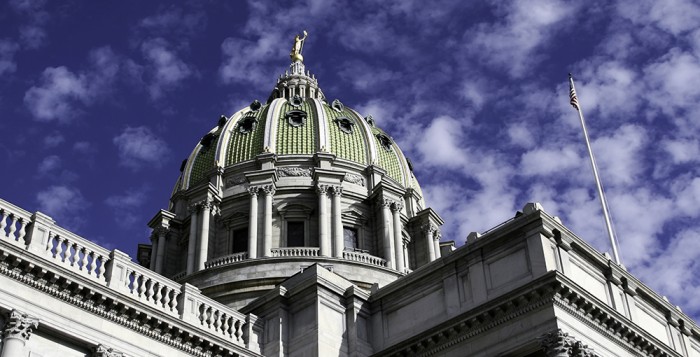Governor Signs Executive Order Increasing Minimum Wage for State Workers
Harrisburg, PA – Building on his commitment to create Jobs That Pay as Pennsylvania’s economy continues to expand, Governor Tom Wolf today signed an executive order that increases pay for employees under the governor’s jurisdiction to no less than $12 an hour on July 1, 2018 and raises the wage by 50 cents a year until reaching at least $15 per hour in 2024.
“Pennsylvania must be a place where hard work is rewarded, but today too many people cannot afford the basics,” said Governor Wolf. “This executive order increases the wage floor for state workers and state contractors, but the General Assembly has not given all minimum wage workers a raise in nearly a decade. More than half of the states have a higher minimum wage, including all of our surrounding states, leaving many Pennsylvanians behind. Raising the wage puts more money in their pockets which generates business for our economy and makes the commonwealth stronger. Hardworking men and women should not have to wait any longer. It’s time for the General Assembly to join me and raise the wage.”
Workers in Pennsylvania earning the minimum wage of $7.25 an hour have only 26 percent of the purchasing power they did in 1979. A family of two working full-time and earning minimum wage falls below the poverty line. Increasing the minimum wage is a win-win for workers and the economy. Boosting wages provides workers with more income to purchase items they most need, which generates business for the local economy and reduces costs for state services.
The governor’s executive order also covers employees of state contractors, those that lease property to the commonwealth, and employees that perform direct services to the commonwealth or spend at least 20 percent of their working time on ancillary services related to the contract or lease. After reaching $15 an hour in 2024, the minimum wage rate would increase by an annual cost-of-living adjustment using the percentage change in the consumer price index for all urban consumers for Pennsylvania, New Jersey, Delaware, and Maryland.
The current wage floor for employees is $10.20 an hour under an executive order signed by the governor in March 2016.
Questions, contact RCPA Director of Government Affairs Jack Phillips.
Governor Wolf Announces Renewal of Opioid Disaster Declaration
Governor Wolf Announces Renewal of Opioid Disaster Declaration, Passage of Legislation to Aid in Crisis
Pennsylvania’s School Safety Task Force Update
Editorial: Lend your feedback to the Pa. School Safety Task Force
RCPA is encouraging our members to take this opportunity to provide Governor Wolf and Auditor General Eugene DePasquale with input about what state officials and the mental health community should do to improve school safety. The task force, led by Governor Wolf and Auditor General DePasquale, is compiling a report due later this year.
The Task Force’s mission is to evaluate issues such as funding for school safety, access to physical and mental health support, effectiveness of state requirements for training and security, how well safety issues are reported, and whether precautions like anonymous tip tools are in place. The Pennsylvania School Safety Task Force was formed after the Feb. 14 shooting in Parkland, Florida.
Please use this link to submit feedback.
Scaled-down fiscal code includes school safety funding transfer, big money for CHC
Scaled-down fiscal code includes school safety funding transfer, big money for PA’s Community HealthChoices program.
By Chris Comisac
Bureau Chief
Capitolwire
HARRISBURG (June 22) – This year’s state budget fiscal code – which directs how money appropriated by state lawmakers is to be spent – is trimmer than it has been in many past years.
The actual language of this year’s code totals just 45 pages; it was amended into House Bill 1929 by the Senate early Friday afternoon, and later approved by both chambers of the General Assembly and signed by Gov. Tom Wolf.
While there are plenty of pages covering the usual spending dictation found in any budget fiscal code, there are several new items included this time around.
The Keystone Scholars Grant Program, which was also proposed as a stand-alone bill (Senate Bill 1130), would be created by language within HB1929 on pages 8 through 13.
As part of the program, the State Treasurer is authorized to deposit $100 into a PA 529 account with the stated intent to grow the deposit with interest during the youth of the child and provide the incentive for parents to open their own PA 529 account. The program will be funded through Treasury investment earnings, donations and endowments from the philanthropic community.
According to the Senate Appropriations Committee, 140,000 children are born each year in Pennsylvania. The language within HB1929 would cap the transfer from the Tuition Account Guaranteed Savings Program Fund (PA 529) to the Keystone Scholars Grant Account at $14 million in any fiscal year.
On page 13 of the bill, there are provisions to create a new definition for “lost contact,” with regard to the state’s disposition of abandoned and unclaimed property, so that shares of stock reported to the Pennsylvania Treasury are only those that have truly been abandoned and unclaimed, not merely held in a passive investment account.
The changes to the criteria, which are also contained in House Bill 2167, are anticipated to result in a 10 percent reduction of the state’s net revenue from unclaimed property, to about $68 million.
Like last year, the state is expecting money from the Volkswagen Group of America settlement, which the car company is paying after allegations arose that it was cheating on U.S. Environmental Protection Agency emissions tests.
Language on page 15 of HB1929 would ensure that when it’s received, $30,409,005 from the settlement with be deposited into the General Fund.
On page 20 of the bill, $45 million in transfers to the Business in our Sites Program account are authorized: $10 million from the First Industries Program account, $35 million from the Building Pennsylvania program.
Language from House Bill 431 is also included in the fiscal code, on page 20, creating the Private Dam Financial Assurance Program.
Under that program, a one-time $1,000 fee and an annual fee of 1 percent of the bond amount required by the Department of Environmental Protection shall be deposited into the Private Dam Financial Assurance Fund, with the fees available to be used to establish a revolving loan program to provide maintenance and repair assistance once the fund’s balance is equal to or greater than $1.5 million.
The Rainy Day Fund is supposed to get its first deposit since before the Great Recession, and the fiscal code, on page 26, increases the amount to be transferred to the fund from 25 percent to 50 percent of any surplus in the General Fund for fiscal year 2017-18, which is estimated to provide an additional $9.9 million to the fund.
Water and sewer projects are to get some extra funding – $35 million in total – as part of language found within the fiscal code on page 27.
That funding – to be made available for water and sewer projects with a cost of not less than $30,000 and not more than $500,000 – comes by way of $10 million coming from funds available to the Commonwealth Financing Authority (CFA), as well as a $25 million transfer from the First Industries Program.
Like many other fiscal codes, this one alters the distribution of Tobacco Settlement Fund payments (on pages 28 through 30):
*4.5 percent for tobacco use prevention and cessation programs ($15,539,000);
*12.6 percent for health and related research under Section 906 of the Tobacco Settlement Act ($43,509,000);
*1 percent for health and related research under Section 909 of the Tobacco Settlement Act ($3,453,000);
*8.18 percent for the Uncompensated Care Payment Program ($28,246,000);
*30 percent for the purchase of Medicaid benefits for workers with disabilities ($103,594,000); and
*43.72 percent shall remain in the fund to be separately appropriated for health-related purposes ($150,786,000).
In addition to $351,815,000 distributed for health-related programs during FY2018-19, there’s a one-time $15.4 million transfer to the Office of Attorney General Criminal Enforcement Restricted Account for criminal enforcement – this money comes from the recently announced settlement reached by the Attorney General and tobacco companies that, according to the Office of Attorney General, will deliver a one-time amount of $357 million to Pennsylvania.
The notable difference between this year’s disbursements and last year’s fiscal code tobacco funding disbursements is last year 13 percent of the funding was devoted to home- and community-based services; this year, other than $15.4 million transfer to the Attorney General, the remainder of that one-time settlement windfall (Roughly $341.6 million) will be used for the state’s Community HealthChoices program, Pennsylvania’s mandatory managed care program providing home- and community-based care for individuals who are eligible for both Medical Assistance and Medicare (dual eligibles), older adults, and individuals with physical disabilities.
The other difference is 43.72 percent of this year’s funding will go to health-related purposes that are separately appropriated; last year’s fiscal code directed 30.72 percent to that purpose.
Just as the distribution of tobacco settlement funds can be found in every fiscal code, so are distributions from the Pennsylvania Race Horse Development Fund.
On pages 32, 34 and 35 of HB1929 are provisions that transfer from the fund $19,659,000 (in 22 weekly installments) for agricultural-related programs, and another $10,066,000 for enforcement of medication rules and regulations in FY2018-19.
The fiscal code, on page 35, also transfers $2.5 million from the sale of liquor and alcohol to the Department of Drug and Alcohol Programs.
Clarifications regarding the state’s First Chance Trust Fund are spelled out on pages 35 and 36, requiring that when determining preference for student scholarships or programs that benefit children, the victimization of the student or child, the impact of crime on the student or child and the risk factors identified by the current policy statement, be the factors that are considered.
More funds distribution language is found on pages 38 and 39 of HB1929, with the provisions specifying that for the $20 fee collected for the issuance of death certificates by a local registrar, $3 shall be retained by the local registrar until the $60,000 threshold is met, after which fees will be transmitted to the Department of Health to be deposited in the General Fund. Of the remainder of that fee, $16 shall be deposited in the Vital Statistics Improvement Account and the other $1 is to be transmitted to the Department of Health for distribution to the county corner or medical examiner. With regard to the funding to be deposited into the General Fund, the Senate fiscal note offer no detail regarding the potential fiscal impact as it will be entirely dependent upon the demand for death certificates when there is a local registrar.
The code bill, on page 39, requires the amount of $7 million to be used to augment funds appropriated to the Bureau of Occupational and Industrial Safety, and the remaining funds – believed to be less than $1 million – to be transferred to the General Fund.
Funding for the Department of Labor and Industry’s Reemployment Fund is reauthorized through Sept. 30, 2022, on pages 39 and 40 of the code.
Five-percent of the unemployment compensation contributions paid by employees will be contributed to the fund, with those annual contributions expected $10 million in 2018, $10 million in 2019, $13 million 2020, $14 million in 2021, and $15 million in 2022.
In an effort to pump more money ($14 million, coming from the Property Tax Relief Fund) into the State Lottery Fund, HB1929 (on page 40) alters the definition of “income” with regard to the state’s Taxpayer Relief to exclude an amount equal to 50 percent of the average retired worker Social Security payment for a person who receives pension benefits from the Federal Civil Service Retirement System and was not required to make Social Security payments.
The bill, on page 41, also generates an additional $7.1 million for the state’s Access to Justice Account (which provides civil legal assistance to poor and disadvantaged Pennsylvanians) by imposing an additional $2 surcharge on all court filings, as authorized by last year’s fiscal code.
The funding for a new school safety program is transferred by the fiscal code (on pages 42, 42 and 75), ensuring that $60 million is deposited into The School Safety and Security Fund.
Of the $60 million, $30 million is transferred from funds restored from Gov. Tom Corbett’s FY2014-15 line item vetoes that were overturned by the courts late last year. Another $15 million is transferred from fines and fees collected by the Judiciary, with the last $15 million transferred from Personal Income Tax revenue.
The reinstatement of funding from those line item vetoes is spelled out on pages 44 and 45 of HB1929. With $30 million of the restored funds used for the school safety program, the code lapses the remaining $35.1 million.
Found on pages 42 and 43 of HB1929 is authorization for the state Transportation Secretary to waive, for good cause, the requirement for local matching funds as part of the Multimodal Transportation Fund, if the applicant for assistance is the Philadelphia Regional Port Authority (in addition to the existing allowance for municipalities. The match requirements for multimodal funding through the Commonwealth Financing Authority portion of the program are also waived for both, with all of the aforementioned provisions to expire on Dec. 31, 2019.
Pages 67 and 68 contain language providing $30 million annually for the Department of Revenue to administer its Enhanced Revenue Collection Account through FY2019-20.
The administration of the hybrid retirement plan created for the state’s two public pension plans get some funding through the fiscal code. On page 75, a total of about $10.1 million ($4.9 million for the State Employees’ Retirement System, and $5.2 million for the Public School Employees’ Retirement System).
And the dairy industry gets some additional support – $5 million – through the fiscal code, with pages 75 and 76 of HB1929 authorizing yet another transfer from the First Industries program to the Commonwealth Financing Authority for “research and development, organic transition, value-added processing and marketing grants.”
Some other odds and ends from the code:
*The Independent Fiscal Office this year, when it came time for the agency to do its initial and final revenue estimates, ran into some timing issues with regard to corporation tax collection information. Specifically, the collections in May came in later than the IFO expected, and in June, the IFO delayed their June 15 final revenue estimate until June 18 to ensure they captured the tax information. HB1929 (on pages 36 and 37) changes the IFO’s deadlines for the initial and final revenue estimates to May 20 and June 20, respectively, in hopes of addressing the issue going forward.
*Last year’s budget was delayed several months, with that delay preventing the state from re-implementing a moratorium on new applications to the state’s PlanCon program (which provides school districts with some financial help when the districts embark on construction projects). Because the moratorium was not reinstated until the FY2017-18 budget was completed, several school districts submitted PlanCon applications.
On page 43, HB1929 allows all districts that submitted PlanCon applications during the budget stalemate, and which proceed with construction before July 1, 2021, to “be awarded a one-time capital grant, if available, for the approved project in lieu of approved reimbursement payments or, if not available, shall receive payments in the form of reimbursements.”
According to Senate Appropriations Committee Majority Chairman Pat Browne, R-Lehigh, several of the school districts that submitted applications last year are suing the Department of Education for the money that would have been available through the old PlanCon program, and it’s hoped HB1929’s language will help to resolve that issue. Browne added that efforts will intensify during the next year to create a new PlanCon program, implementing recently-released recommendations to improve the process, which many lawmakers believe should occur before the General Assembly considers restarting the reimbursement program.
*On pages 16, 17 and 18, the cap on the number of qualified tours within the Concert Tours Tax Credit is increased from 5 to 10 in FY2018-19. The language also allows the Department of Community and Economic Development to, at its discretion, approve tax credits for two additional tours in FY2018-19, which would count as an advance award against the cap available in the next succeeding fiscal year.
*And pages 37 and 38 call for the Department of Conservation and Natural Resources to, in consultation with PennDOT and utilizing existing state roads and state forest roads, develop, open and maintain an ATV trail connecting with Sproul State Forest the Whiskey Springs ATV trail (in western Clinton County) to the Blood Skillet ATV trail (in northeastern Center County) by April 1, 2020; and by April 1, 2024, implement the full Northcentral Pennsylvania ATV initiative, creating a network of ATV trails connecting Clinton County to the New York State border, by utilizing existing state roads and state forest roads.
Questions, contact RCPA Director of Government Affairs Jack Phillips.
Wolf Signs PA School Safety Bill
Bipartisan Budget Bolsters Economy, Workforce through Education, Skills Training
Governor Wolf’s Employment First Policy Becomes Law
On June 19, 2018, Governor Tom Wolf signed House Bill 1641, codifying the Employment First Policy that the governor established by executive order in March 2016 to increase competitive employment opportunities for people with disabilities.
“My executive order two years ago focused Pennsylvania on being a model state that is hospitable to workers with disabilities and I’m proud to sign this bill adding the weight of law,” said Governor Wolf. “This is a win-win for Pennsylvania. Our employers need smart and skilled workers and increasing employment opportunities ensures people with disabilities can achieve greater independence and inclusion in our communities.”
House Bill 1641, sponsored by Rep. Bryan Cutler, creates the Employment First Act requiring state, county, and other entities receiving public funding to first consider competitive integrated employment as the preferred outcome of publicly funded education, training, employment, and related services, and long-term services and support for individuals with a disability who are eligible to work under state law.
The statute also creates the Governor’s Cabinet for People with Disabilities and the Employment First Oversight Commission. The Governor’s Cabinet for People with Disabilities will review existing regulations and policies to recommend changes to laws, regulations, policies, and procedures that ensure implementation of Employment First. The Employment First Oversight Commission will establish measurable goals and objectives to guide agencies and report annual progress.
Following the governor’s Executive Order 2016-03, entitled Establishing ‘Employment First’ Policy and Increasing Competitive-Integrated Employment for Pennsylvanians with a Disability, the Departments of Labor and Industry, Human Services, and Education have been working to obtain stakeholder and business input to meet the administration’s goals. The agencies, which helped to develop HB 1641, released recommendations in September 2016.
The recommendations include:
- Review, identify, and change policy to align with Executive Order 2016-03.
- Raise the expectations of employment goals for children with a disability at an early age. Work with parents and publicly funded programs to shift expectations towards this goal.
- Prepare young people with a disability to become working adults with a disability.
- Transition students from secondary education to adult life. Assist adults with a disability in getting and keeping a job.
- Improve access to reliable transportation to get to and from work, on time, every time.
- Lead by example – improve state contracts and reduce barriers to commonwealth employment.
- Expand private-public partnerships.
- Increase public awareness.
- Collect and coordinate data.
- Implement, monitor, and provide accountability.
In support of the Employment First initiative, 20 Pennsylvania college students with disabilities are participating in a 12-week paid internship with the Wolf Administration this summer. The interns are working in positions at state agencies related to their academic backgrounds and gaining experience in their field of study and building connections with potential employers.
Department of Labor and Industry Releases Proposed Overtime Regulations
Today, the Pennsylvania Department of Labor and Industry has released their proposed rule making response to Governor Wolf’s proposal to modernize outdated overtime rules to strengthen middle class families and provide fairness to workers.
Members are asked to review the proposed regulations and are encouraged to provide comments to the Department. If members do submit comments, please send those comments to RCPA. Contact RCPA Director of Government Affairs Jack Phillips with questions.
Outpatient Psychiatric Oversight Act – Now Act 25 of 2018
Last week, Governor Wolf signed into law the Outpatient Psychiatric Oversight Act – now Act 25 of 2018. Below is the exact language contained in Act 25:
An Act
Providing for outpatient psychiatric oversight.
The General Assembly of the Commonwealth of Pennsylvania hereby enacts as follows:
Section 1. Short title.
This act shall be known and may be cited as the Outpatient Psychiatric Oversight Act.
Section 2. Definitions.
The following words and phrases when used in this act shall have the meanings given to them in this section unless the context clearly indicates otherwise:
“Advanced practice professional.” A person who:
(1) (i) holds a current Pennsylvania license as a certified registered nurse practitioner with a mental health certification; or
(ii) obtains a mental health certification within two years of being hired by a psychiatric outpatient clinic or within two years of the effective date of this section, whichever is later; or
(2) (i) holds a current Pennsylvania license as a physician assistant with a mental health certification; or
(ii) obtains a mental health certification within two years of being hired by a psychiatric outpatient clinic or within two years of the effective date of this section, whichever is later.
“Department.” The Department of Human Services of the Commonwealth.
“Full-time equivalent.” Thirty-seven and one-half hours per week.
“Interactive audio and video.” Real-time two-way or multiple-way communication between a psychiatrist and an individual.
“Outpatient psychiatric clinic.” A nonresidential treatment setting in which psychiatric, psychological, social, educational and other related services are provided under medical supervision. It is designed for the evaluation and treatment of individuals of any age with mental illness or emotional distress. Outpatient services are provided on a planned and regularly scheduled basis.
“Psychiatrist.” A physician who has completed at least three years of a residency in psychiatry and is licensed to practice psychiatry in this Commonwealth.
Section 3. Requirements.
The following shall apply:
(1) Except as provided for in paragraph (2), an outpatient psychiatric clinic shall have a psychiatrist on site for two hours of psychiatric time per week for each full-time equivalent treatment staff member.
(2) Fifty percent of the required on-site psychiatric time under paragraph (1) may be provided by:
- An advanced practice professional.
(ii) A psychiatrist off-site by the use of interactive audio and video using technology that conforms to industrywide compressed audio-video communication and protects confidentiality under Federal and State law in accordance with department-issued guidelines. Interactive audio without video, electronic mail message or facsimile transmission may not be used to meet the requirement under paragraph (1).
(iii) A combination of subparagraphs (i) and (ii).
Section 4. Regulations.
The department shall promulgate regulations as necessary to carry out the provisions of this act.
Section 5. Effective date.
This act shall take effect in 60 days.
Questions, contact RCPA Director of Government Affairs Jack Phillips.

















